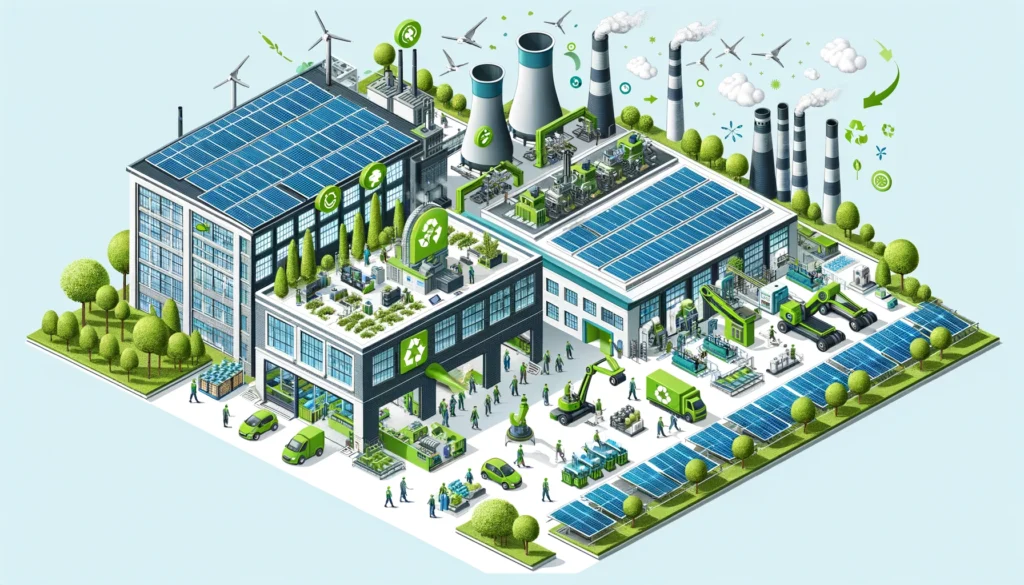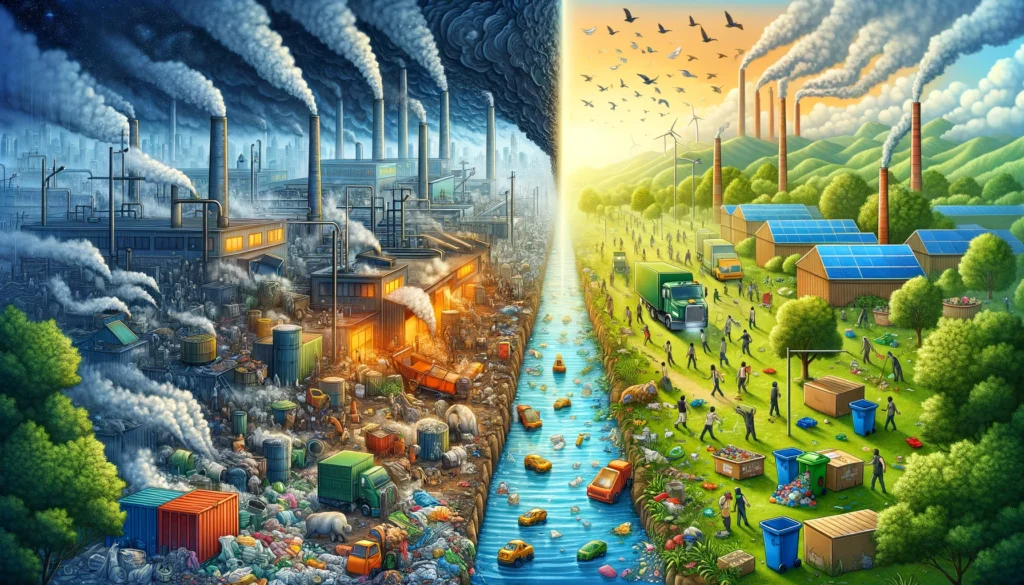Part V: “Mindful Choices: Navigating Ethical Consumption and Production”
Welcome to the fifth part of our series where we explore the transformative power of our everyday decisions. In this segment of our series, we delve into the concepts of ethical consumption and production, unraveling how these practices not only benefit the environment but also promote social equity and sustainable economic growth.
Embark on a journey with us to understand the intricate relationship between the products we buy, the processes behind their creation, and the impact they have on the world. We’ll uncover the challenges and triumphs of adopting ethical practices in our consumption and production habits, highlighting the significance of making informed and conscious choices. Join us as we navigate the path towards a more responsible and mindful way of living, where every purchase and production decision can contribute to a healthier, fairer, and more sustainable world.
Understanding Ethical Consumption
Ethical consumption is about making choices that positively impact the world. It’s when people think carefully about what they buy and choose products that do good for the environment and society. This approach to shopping helps ensure that our purchases support sustainable practices, fair wages, and responsible companies.
- Mindful Shopping Choices: Ethical consumers look beyond the price and appearance of products. They consider how items are made, who makes them, and the impact on the environment and society. This might mean choosing products that are made without harming animals, that come from local businesses, or that are made by workers who are paid fairly.

- Support for Ethical Companies: By choosing to spend money on products from companies that are committed to ethical practices, consumers can encourage more businesses to adopt responsible behaviors. This support can range from buying organic food, supporting eco-friendly fashion, or choosing services from companies that give back to their communities.
- Reducing Environmental Impact: Ethical consumption often involves choosing products with less packaging, products that are made from recycled materials, or items that are more durable and long-lasting. This reduces waste and the environmental footprint of our shopping habits.
- Awareness and Advocacy: Consumers who practice ethical consumption often become advocates for ethical practices in their communities and networks. They share information about ethical products and companies, raising awareness and influencing the shopping habits of others.
- Empowering Change Through Consumption: Ethical consumption empowers individuals to contribute to societal and environmental change through their daily choices. It’s a powerful way for consumers to align their spending with their values and to drive demand for responsible and sustainable business practices.
Understanding ethical consumption is about recognizing the power of our choices and the impact they have on the world. By choosing ethically, we can support a healthier planet and a more equitable society.
The Journey to Ethical Production
Ethical production is the path businesses take to create products that are not only good for the economy but also beneficial to society and the environment. This journey involves transforming traditional manufacturing processes to prioritize sustainability, worker rights, and environmental health.
- Resource Efficiency and Sustainability: Companies on this journey use resources wisely, minimizing waste and pollution. They adopt sustainable practices like using renewable energy, recycling materials, and reducing carbon emissions to lessen their environmental impact.

- Fair Labor Practices: Ethical production also means ensuring that workers are treated fairly and with respect. This includes providing safe working conditions, fair wages, and opportunities for employee advancement. Companies committed to ethical production actively work against exploitation and child labor.
- Transparency and Accountability: Being open about production processes and taking responsibility for the company’s impact on people and the planet are key aspects of ethical production. This transparency helps consumers make informed choices and builds trust between producers and buyers.
- Collaboration for Improvement: Companies often work with environmental groups, local communities, and industry partners to improve their production practices. This collaboration can lead to innovations that make production more sustainable and ethical.
- Continuous Improvement: Ethical production is not a one-time achievement but a continuous journey of improvement. Companies must regularly evaluate their practices and make changes where necessary to ensure they remain aligned with ethical standards.
The journey to ethical production is crucial for building a more sustainable and just world. It shows that businesses can thrive while respecting the environment and enhancing the well-being of their workers and communities.
Challenges and Solutions
While the journey toward ethical consumption and production is rewarding, it comes with its own set of challenges. However, for every challenge, there are solutions that can help us navigate these obstacles effectively.
- Challenge: Greenwashing: One major issue is greenwashing, where companies falsely claim their products are environmentally friendly. This can mislead consumers who want to make ethical choices.
- Solution: The key to combating greenwashing is education and awareness. Consumers can learn to identify genuine certifications, like organic or fair trade labels, and research companies’ environmental records and practices.

- Challenge: Higher Costs: Often, ethically produced goods are more expensive than their conventional counterparts, which can deter budget-conscious consumers.
- Solution: To address this, consumers can prioritize which ethical practices are most important to them, such as supporting local farmers or buying products with less packaging. Over time, as demand for ethical products increases, their prices may decrease. Also, buying in bulk, choosing seasonal items, and participating in community-supported agriculture (CSA) programs can make ethical products more affordable.
- Challenge: Accessibility: Sometimes, finding ethically produced products can be difficult, especially in areas with limited shopping options.
- Solution: Online shopping can expand options, allowing consumers to purchase from ethical companies and cooperatives. Additionally, community initiatives, like local markets and swap meets, can increase access to sustainable goods.
- Challenge: Lack of Information: Consumers often struggle with a lack of clear information about the ethical credentials of products.
- Solution: Transparency in product labeling and company practices can help, as can supporting businesses that provide detailed information about their supply chains and production methods. Consumer demand for transparency can also drive more companies to disclose their ethical practices.
- Challenge: Overcoming Skepticism: Many consumers are skeptical about the real impact of their ethical consumption choices.
- Solution: Education about the tangible benefits of ethical consumption and production can help. Sharing success stories and data on the positive environmental and social impacts of these practices can inspire more people to make ethical choices.
By addressing these challenges with practical and informed solutions, we can continue to advance towards a more ethical and sustainable future in consumption and production practices.
Author’s Note
Thank you for joining us on this exploration of ethical consumption and production. Your choices as a consumer have the power to shape a more sustainable and just world. By becoming more mindful of how we buy and use products, we can make a significant impact on our planet and its inhabitants. Let’s continue to make choices that reflect our care for the environment and each other.
G.C., Ecosociosphere contributor.
References and Further Reading
- “The Conscious Consumer: Promoting Economic Justice Through Fair Trade” by Rose Benz Ericson – Provides insights into the fair trade movement and its impact on global economic justice.
- “Ethical Chic: The Inside Story of the Companies We Think We Love” by Fran Hawthorne – Examines the practices of companies that claim to be ethical and how they stack up against their claims.
- “Shopping for a Better World: A Quick and Easy Guide to Socially Responsible Supermarket Shopping” by The Council on Economic Priorities – Offers a guide for consumers looking to make ethical choices in their everyday shopping.





Comments
I don’t think the title of your article matches the content lol. Just kidding, mainly because I had some doubts after reading the article.
Thanks for sharing. I read many of your blog posts, cool, your blog is very good.
Your point of view caught my eye and was very interesting. Thanks. I have a question for you. https://accounts.binance.com/de-CH/register?ref=UM6SMJM3